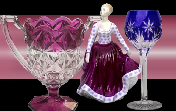
Collector Plates History and Information
The first recorded Limited Edition collector plate came from the Bing and Grondahl factory of Denmark in 1895. Titled “Behind The Frozen Window”, it was the first known commemorative plate to be limited in production with date and title information fired on the plate itself and was followed by a second plate the following year as the first Annual Bing and Grondahl Christmas plate titled “Jule Aften 1896”. An annual plate was produced each year thereafter and still is today under the Royal Copenhagen name.
From 1904 until post WWII, other Scandinavian and German companies introduced annual Christmas series plates including Alumunia, Royal Copenhagen, Rosenthal and Konigliche.
By 1949, as interest in the famous blue and white Danish plates rose, plates were being imported and sold in the United States through dealers and auctions. It wasn’t long before demand for earlier issues created a collector plate market and prices began to increase on out-of-production issues. As the collector plate market grew, other European companies produced and exported Limited Edition plates to North America.
By the early 1970’s, J. Roderick MacArthur saw an opportunity to organize the buying and selling of collector plates by telephone just as stocks and bonds were bought and sold. Thus began the Bradford Exchange, the leading dealer in first-issue collector plates. By the 1980’s, the Bradford Exchange was fully computerized with over 11,000 transactions each day. By this time, Lalique and Orrefors had produced Annual Crystal plates, Limoges, Royal Doulton, and Wedgwood were producing fine china Collector Plates and American companies such as Reed & Barton produced silver and pewter plates.
As the theme of Collector Plates grew from Christmas to children, to birds, flowers, animals, famous people, movies, rhymes and tales and so on, so did the number of manufacturers. These included Anna-Perenna, W.S.George, Edwin M. Knowles and Dominion China of Canada. The first Chinese collection called Beauties of the Red Mansion and the first Russian collection called Russian Legends became instant best-sellers and remain popular collector plates today.
Because Collector Plates are traditionally taken from fine works of art from such notables as Norman Rockwell, Donald Zolan, Lena Liu, Sandra Kuck, Edna Hibel, etc, the trend of buyers is to collect the whole series of any one title. This created the Secondary Market of Collector Plates as buyers actively sought out first issues no longer in production and available only through dealers, auctions, second hand shops the Bradford Exchange and now over the Internet. Values fluctuated with demand almost daily during the highest activities of the 1970’s, 1980’s and early 1990’s.
Limited Edition Collector Plates have recognized standards to maintain for would-be collectors. All plates are limited in production and once closed, are never produced again. They are usually taken from signed works of art, produced by reliable companies of quality workmanship, are usually sponsored by a prestigious institution, may have some commemorative importance and usually form part of a theme series. Maintaining the original paper work including the Certificate of Authenticity (if produced), is important for most collectors. Original boxes for storing and shipping are also handy but do not usually affect the value.
Today, collector plates are still in production by many companies and older, long out-of-production issues are bought and sold on the Secondary Collector Plate market by buyers starting a collection or replacing broken or lost plates.
Visit The Glass Menagerie to view a Collection of over 2500 Retired Limited Edition Collector Plates .
|




